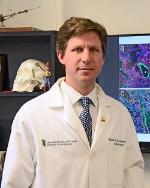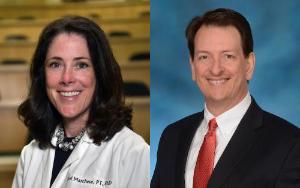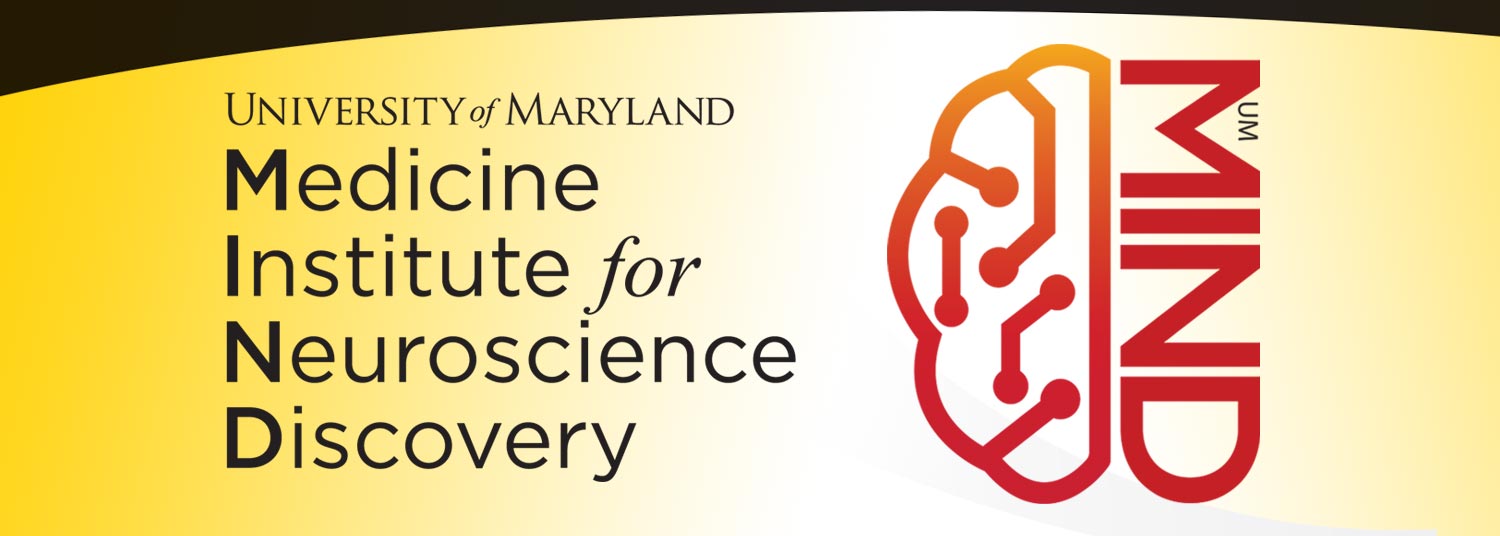At the University of Maryland – Medicine Institute for Neuroscience Discovery (UM-MIND), we aim to accelerate translational research of the brain by facilitating interaction between basic and clinical scientists and enhancing collaborative research across the University of Maryland School of Medicine (UMSOM), the University of Maryland, Baltimore (UMB) and with our local and regional partners.
Launched in 2023, our institute brings together a vibrant community of basic and clinical faculty, postdoctoral fellows, graduate students, and research staff across neuroscience disciplines, representing researchers from many departments, institutes, centers, and programs. UM-MIND creates a cohesive structure through which to unite these world-class researchers under one umbrella, encouraging multidisciplinary collaboration that promises to accelerate the discovery and translation of novel therapies for the most pressing problems in brain science.
Learn more about our institute's mission and goals by reading the Director's Message here, written by Margaret (Peg) McCarthy, PhD, the James and Carolyn Frenkil Dean's Professor and Director of UM-MIND.
Our approach centers around three pillars of focus: Neurodevelopment & Neuropsychiatric Disorders, Neurotrauma & Brain Injury, and Aging & Neurodegeneration.
The first pillar of Neurodevelopment & Neuropsychiatric Disorders will address how the brain forms in the mother’s womb and how genetics, epigenetics, and sex and gender play a role in this development, as well as what happens when these processes go wrong and lead to neurodevelopmental disorders such as autism or schizophrenia.
 “With more than 53 million Americans, adults, and youths, experiencing mental illness and/or substance use disorders over the past year, understanding the causes and discovery of effective treatments is paramount to our nation’s health and future. UM-MIND, through a highly collaborative approach between neuroscience experts, will work to uncover the mysteries of such devasting illness and enhance a global understanding and approach to effective care and will create opportunities to enhance quality of life around the world," said Jill RachBeisel, MD, Dr. Irving J. Taylor Professor and Chair of Psychiatry.
“With more than 53 million Americans, adults, and youths, experiencing mental illness and/or substance use disorders over the past year, understanding the causes and discovery of effective treatments is paramount to our nation’s health and future. UM-MIND, through a highly collaborative approach between neuroscience experts, will work to uncover the mysteries of such devasting illness and enhance a global understanding and approach to effective care and will create opportunities to enhance quality of life around the world," said Jill RachBeisel, MD, Dr. Irving J. Taylor Professor and Chair of Psychiatry.
The second pillar of Neurotrauma & Brain Injury encompasses brain cancers, such as neuroblastoma and glioblastoma, traumatic brain injury, and stroke research. These studies will focus on the early, severe inflammation right after injury and how long-term damage accrues after the shift to chronic inflammation.
 “Advances in brain imaging, neural network analyses, genetics, brain-computer interface technologies, and more are opening exciting opportunities to study and apply new information related to difficult-to-treat neurological conditions. For certain conditions like traumatic brain injury and glioblastoma, few if any major advances have occurred in the last two decades,” said Graeme Woodworth, MD, Howard M. Eisenberg Distinguished Professor and Chair of Neurosurgery. “Now is an exciting time to merge the latest advances, coalescing inter-disciplinary neuroscience teams in UM-MIND, which will accelerate the discovery of novel therapies and offer new hope for patients.”
“Advances in brain imaging, neural network analyses, genetics, brain-computer interface technologies, and more are opening exciting opportunities to study and apply new information related to difficult-to-treat neurological conditions. For certain conditions like traumatic brain injury and glioblastoma, few if any major advances have occurred in the last two decades,” said Graeme Woodworth, MD, Howard M. Eisenberg Distinguished Professor and Chair of Neurosurgery. “Now is an exciting time to merge the latest advances, coalescing inter-disciplinary neuroscience teams in UM-MIND, which will accelerate the discovery of novel therapies and offer new hope for patients.”
The third pillar of Aging & Neurodegeneration will concentrate on both healthy aging of the brain and neurodegenerative disorders of aging, such as dementia, Alzheimer’s, and Parkinson’s disease which disrupt cognition and/or movement.
 "UM-MIND is an exciting new initiative that will bridge collaborations and provide opportunities to advance research in exploring the brain’s motor mechanisms that contributes to movement dysfunction,” said Victoria Marchese, PhD, PT, Jane Kroh Satterfield Endowed Professor and Chair of Physical Therapy and Rehabilitation Science.
"UM-MIND is an exciting new initiative that will bridge collaborations and provide opportunities to advance research in exploring the brain’s motor mechanisms that contributes to movement dysfunction,” said Victoria Marchese, PhD, PT, Jane Kroh Satterfield Endowed Professor and Chair of Physical Therapy and Rehabilitation Science.
"UM-MIND will greatly facilitate collaborative campus research in clinical and translational neurosciences, focusing on a number of devastating neurological disorders including stroke, dementia, autism, brain cancer, ALS, multiple sclerosis, and epilepsy," said Peter Crino, MD, PhD, Dr. Richard and Kathryn Taylor Endowed Professor and Chair of Neurology.


